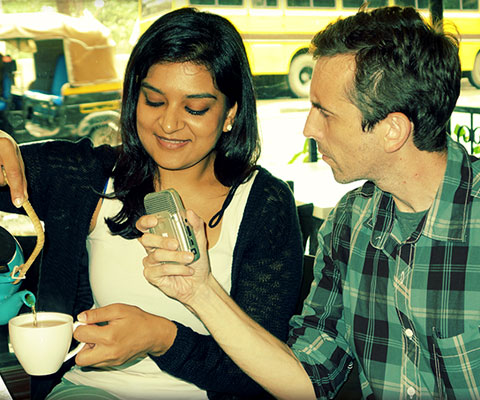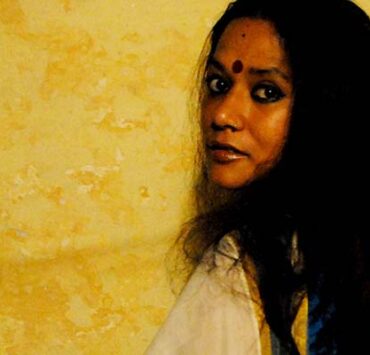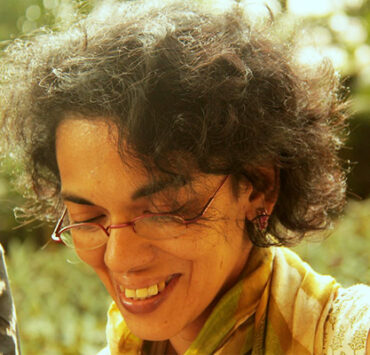Started by documentary filmmaker Michael Burns and comedic actress Kaneez Surka, Tall Tales is a live storytelling initiative in Mumbai that aims to showcase first-person stories “from Mumbai and beyond”. While other similar events in the city follow an open-mic format, inviting just about anyone to narrate stories based on a theme or cue, Tall Tales offers a more curated and polished alternative. At Tall Tales events, all stories are edited, rehearsed, and deliberately performed to enhance the experience for everyone present.
Kaneez and Michael recently spoke to us in an exclusive interview about managing audience expectations, crafting great stories, and the way forward for live storytelling in Mumbai. Read on for excerpts—
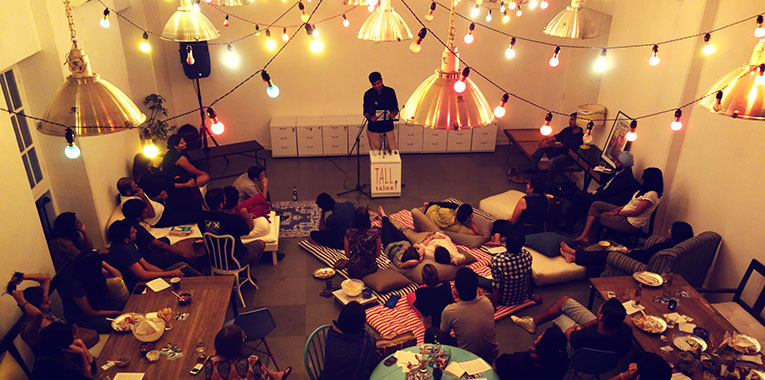
Ministry of New in Lalbaug is one of the venues for Tall Tales events in Mumbai. Photograph by Michael Burns.
Could you tell our readers a little bit about what Tall Tales is?
Michael: Tall Tales is live storytelling in Mumbai. The criteria for what makes a story eligible for Tall Tales is quite simple: it has to be a true story, and it has to be a story that is meaningful to the storyteller and which in some way has changed the way that they look at the world. I think that the difference between a good story and a great story is maybe the extent to which the event [in the story] has changed the way you feel, the way that you look at yourself and your own potential. Somebody asked me at an event the other day about which stories I like best, the funny ones or the dramatic ones. I think that the great stories are always a mix of both. There needs to be a build-up and release in every good story.
How did the two of you come up with the idea of doing a live storytelling event in Mumbai?
Kaneez: Michael and I met at an improv comedy class—Michael also does improv in Mumbai—and in March this year, he contacted me and said that he was looking forward to starting this storytelling event in Mumbai, and if I would like to be a part of it. And yeah…
Michael: I contacted your people, you don’t let anyone—
Kaneez: Yeah, obviously, he contacted my agent. I don’t talk to commoners, you know, directly (laughs). But I thought it was a great idea, and I said let’s do this.
Michael: There are other people in the city doing live storytelling. There’s one initiative that’s based on slides, you know, little mini-stories about each slide, which is nice. There’s also Katha Cues, which is more like spontaneous storytelling. What we’re trying to do is to perfect the art of storytelling as much as we can, which means working with the storytellers over the course of sometimes even months to take their original story and heighten it and chisel it and edit things out and add certain things, so that by the end of it, they have the best possible rendition of the event that happened to them. That’s our brand; we’re really trying to craft the stories.
Kaneez, you were born and brought up in South Africa. When did you move to Mumbai and how did the shift to improv comedy happen for you?
Kaneez: I moved to Mumbai about nine years ago. In South Africa, I studied law and psychology. Wait, let me rephrase that: I did a B.A. degree, majoring in law and psychology.
Michael: You didn’t study jack shit.
Kaneez: Yeah, I always call it a ‘bugger-all’ degree because there’s nothing that you can do with it (laughs). After university, I thought I’d take a year off and go to India, before I continued with my law education. But then I kind of fell in love with Mumbai and told my parents that I wanted to live here. I thought I’d live in the city for another year before I moved back. That’s when I got my T.V. show (The Week That Wasn’t, with Cyrus Broacha), and things started moving forward in that direction.
Did you actively seek out the comedy scene in Mumbai?
Kaneez: No, it found me, really.
Were you always interested in performing live?
Kaneez: In my final year of high school, my drama teacher told me that for my final piece I should do a comedy piece, because that was my forte. I wanted to do a dramatic piece, but she steered me in the direction of comedy. I guess I had always kind of veered towards comedy in my high school performances. When I came to Mumbai, I did an improv comedy course called ‘Imps’ in 2005 with Divya Palat. The director of The Week That Wasn’t, Kunal Vijayakar, was present at one of those performances, and he asked me if I wanted to be a part of his T.V. show. I’ve been a part of the improv comedy scene since then. I took another proper improv class in 2009 as well. It’s been going well, touch wood. And now I’m really excited about doing Tall Tales with Michael. I’m proud of it. It’s important to be proud of what you do, right?
Of course.
Kaneez: Yeah, there are a lot of people doing a lot of stuff out there, and it’s important.
Michael: It’s nice to start out strong, too, you know? It’s one thing to just find your feet, and that’s fine too, but we tried to put a lot of thought into how it would be, so when we started, it was pretty much the same way that it is now.
Kaneez: Exactly. Michael and I were really happy with how our first show turned out.
Michael, you mentioned that as a boy, you used to listen to a lot of radio shows in the U.S. Is that what got you into storytelling?
Michael: Most liberal-minded people in the U.S., you know, it’s like a cliché: we listen to National Public Radio. I consider myself a little further to the left than even N.P.R. (smiles). People on the commute, they listen to N.P.R. on the way home, and on the weekends, a lot of people listen to the same radio programs. These days, the most popular radio show in the country involves live storytelling, called This American Life. When it’s broadcasted every Saturday in Chicago, it is live. It’s popular internationally in the form of podcasts and they even made a T.V. show based on it on Showtime a few years ago. Since so many in my social circle listen to this show, we all have opinions about it and we all like to talk about it. It’s almost like a social currency, the way other people might bond over a T.V. show. I always appreciated the power of radio.
One day I was on my way to the grocery store, and there was a speech that was on the radio—on N.P.R. they call this a Driveway Moment, except that I wasn’t in the driveway, I was in a parking lot. The show that was on was so good that I couldn’t stop listening. Unfortunately, the show had just started, so I was stuck in the parking lot for the next 45 minutes, listening to it. It was a really inspirational speech that ended up changing the rest of my life. I even have a screengrab of a radio wave from that speech tattooed on my shoulder.
Kaneez: Are you serious?
Michael: (Laughs) I know, it’s bizarre.
Kaneez: You have a tattoo on your shoulder?
Michael: Yeah, from this speech.
Kaneez: Are you messing with us?
Michael: Well, eventually you’ll see it, someday…
Kaneez: (Eyes widen)
Michael: … if we all go swimming.
Kaneez: (Laughs)
Michael: I’m not even really into tattoos, but for me, my entire life was defined by this 45-minute speech, you know? I’m not trying to do that with Tall Tales, but I do think that something that appears to be just entertainment or just something to passively intellectualise yourself can actually be profoundly important and life-changing. You never really know when those moments are going to happen. We want to create humorous moments, but we also want to create those moments where people can contemplate what they’re doing with their lives, and also what they hope to be doing.
The two of you started Tall Tales in… June this year?
Michael: Around March. The first show was in June, but we needed some time before that to put the stories together. Whenever you start something, a) you’re not sure whether there’s an audience at first, and b) you need to find the right performers. For the first show, the performers were all people that we knew were good storytellers, and we asked them to tell their own interesting personal stories. It worked and the audience that came for the first show told their friends, who told their friends. By the time the second show came about, it involved a lot of people we didn’t know personally. That was the idea.
Kaneez: It also took some time to understand what kind of event we wanted to put together—the feel of the event and the kind of audience and venues that we were looking for.
Michael: Yeah, we tried to find a venue that was unique, because in this city, there are a hundred distractions all the time. Luckily, we found a place that was in a great location and it was high enough off the road that there was no ambient noise, where the focus could just be on the storyteller alone. This place, Studio X, is so cool, because you can hear a pin drop in there when the storytellers are performing.
Kaneez: We were very particular with what we were looking for in our venues. We were looking for something that would be classy and elegant and comfortable without being pretentious. Almost like you’re sitting in your living room listening to a story.
What are some of your favourite things about Tall Tales?
Michael: Sometimes when Kaneez and I perform, with comedy, especially, some people sitting in the audience, they’re like, ‘make me laugh’, you know?
Yeah, say something funny.
Michael: Yeah, exactly. So there’s this weird kind of tension from the outset. But it’s different with Tall Tales. It’s like a story love fest. People in the audience want the storyteller to succeed, they know that they do some day job that’s completely unrelated to storytelling. Everyone’s rooting for them.
One of my other favourite things about Tall Tales is that people bring their stories to us in this raw form, and we work on them together. That’s really how great storytelling happens. Unless there’s personal genius involved, it’s never really just one person coming up with everything. When they perform it, they get all the credit for the story. I love that all the hard work that the storytellers put in gets affirmed, that the storytellers get such a good feeling about it.
How many people usually turn up for Tall Tales events at Studio X?
Michael: The very first show was on the first night of the monsoon. We had around 100 seats available, and 137 people showed up.
Kaneez: Yeah, it was lovely. On an average, we get around 80 people at every show, though we would like that number to increase.
Michael: I’m not just saying this because I organise Tall Tales, but it really is one of the best deals that you can get in the city. It’s super-entertaining from start to finish, you get to hang out with your friends and listen to really good stories. How many times have you gone out for a terrible movie where you were dying to get out of the theatre, after which you had to pay for snacks and transportation? At the end of it, you’re about Rs. 1,000 lighter and you’ve had a terrible night. With Tall Tales, you pay only Rs. 200 to get into Studio X and you’re guaranteed a great time.
You’ve managed to put together six Tall Tales events so far.
Michael: My God, has it been that many shows already? We try to do one show where we debut the stories, and then there’s an encore. That’s because of the way this city is laid out: there is really no central place for everyone to come to. So we try to have one show in the southern part of the city, and another show in the… southern part of the city?
Kaneez: (Laughs)
Michael: Yeah, that’s something we’ve been working on. We want to have more shows in the northern parts of the city, but again, we’re not just going to do it anywhere. We have to find the right space.
Are you looking at conducting Tall Tales events in other cities as well?
Michael: We’ve had a few invites to do shows outside of Mumbai. We’d eventually like to do that, but we just want to get this thing running like a fine-tuned machine first. We’re looking at putting in about six solid months, trying to make it as perfect as it can be, and then think of taking it elsewhere. Also, when you reach the six-month mark, you suddenly have 50 stories under your belt, and then you can really choose the six best stories from those and travel with them.
Kaneez: What we’d also like to do other than travel with the stories is to set up chapters within other cities, having someone in those cities conduct their own Tall Tales events.
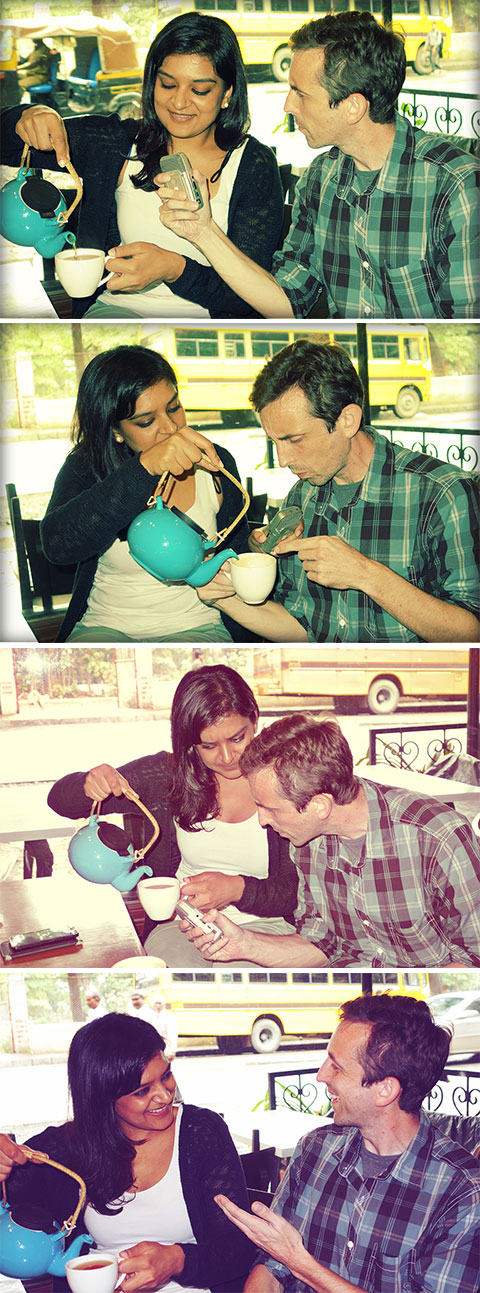
Tea for two. Photographs by Pooja Goenka.
After the first few shows, have there been a lot of people sending in stories for Tall Tales?
Michael: Yes, at this point, we get a new submission every other day via email. The best way to assess a story is to sit down with the person and have them narrate it to you. But because we’re volunteers, the practicality of doing something like that is crazy. We’d have to be out all day listening to stories.
Kaneez: Yeah, it’d be like a full-time job.
Michael: So in our case the best use of everybody’s time is to just get the storytellers to write the story out. I can usually tell within the first few minutes of reading it whether it’s a good story or not. Unfortunately, we get a lot of poetry (smiles). We also get a lot of fiction, because somehow people equate storytelling with fictional stories. Sometimes, we get really nice pieces, but they’re more like op-ed pieces, not stories. Maybe one out of every five submissions that we get is a real story about something that happened to the narrator.
So you’re basically looking for interesting anecdotes?
Michael: Yeah, I’m looking for a personal story that involves something that the storyteller went through. If they can articulate that in extreme detail while giving a strong sense of how they were changed by the process, that’s what we’re looking for. Someone who can connect with the audience while maintaining a sense of fidelity with the story.
Besides the live shows, you’ve also put up videos and audio clips of all the Tall Tales performances on your website. What was the idea behind doing that?
Michael: One of the cool things about Facebook is that you can see where your fans are from. We found that around half of our fans were from other countries. When you have a web presence, you’re basically everywhere, so we wanted to create a situation where people who live outside of Mumbai could actually experience the stories. Believe it or not, you can recapture some of the magic of the stories by watching them on video. And then there’s old-fashioned people like me who like to listen to the audio.
You recently conducted a workshop for school children on how to craft great stories. Are you looking at doing more of the same?
Michael: Yeah, in December we want to do a workshop that’s open to everyone. We really do think that everyone has at least one great story to tell, but what people may not have are the skills to identify the beginning, middle, and end of that story. You can narrate an experience in a terrible way without capturing its essence, or you can tell it while keeping in mind the proper setting, the action, climax, and resolution. I think that there are a lot of people who would appreciate a little guidance along those lines.
Considering that some of the other live storytelling initiatives in the city are open-mic events, do you occasionally come across people who assume that Tall Tales is a similar initiative?
Kaneez: I just got an email from this lady saying, “Can’t wait to perform at your event this week.” (Laughs)
Michael: Yeah, that happens a lot. I was at Studio X two shows ago, and someone called me because he was lost. He said, “I know the show’s starting soon, and I have to get there to perform.” Open-mics are fun, but we want to keep the standard really, really high. Mumbai is great, but one thing about the city that’s annoying is that the audience’s expectations are quite low. A lot of plays, a lot of other shows are really mediocre.
Kaneez: I’ve done mediocre shows myself. It’s like, why aren’t we putting on the best possible show? And the thing is, people are super-talented here. We—everyone, the performers, the audience—just settle for less.
Michael: This is not true for all shows in Mumbai, of course not. But sometimes when you see a show in another country and then come to Mumbai, you can see the difference in the attention to detail, etc. Since we’re both foreigners…
Kaneez: I’m toh Indian, haan?
Michael: (Smiles) … we’ve basically tried to combine the best of what’s in the city with some of those touches from outside, to keep the standard really high. We have monthly shows, but we’ve always maintained that we’d rather skip a month than do a show that’s really mediocre.
Why do you think people settle for less in the city? Is it just that they don’t push themselves enough?
Kaneez: I know that this might sound really condescending, but I think that it’s our job as performers to entertain and, in a way, to educate our audience. Improv and English stand-up comedy and storytelling events are fairly new to audiences in the city, and it’s important to keep the standard high. Sometimes it feels like a lot of the humour is just recycled jokes or sexual humour. Even with a lot of improv shows, it’s the same thing every time.
Do you think that may be due to a lack of exposure to what can be done, to what’s possible?
Kaneez: Yes. I know that from an improv point-of-view, that’s true.
Michael: I think it’s also because striving for excellence is inherently a big risk. If someone gives you a formula and says that you will have a successful show if you do so-and-so, I can understand the logic behind saying, okay, I’ll go down that path, I’ll do what everyone else is doing. What we’re interested in is forging a new path, and also finding success there. That’s a little bit riskier, but that’s also what makes it fun, the fact that you might fail. Someone asked me when I started Tall Tales, if I was afraid that people wouldn’t come to the show. I said, no, the show is going to be great. If people don’t come because they’re not interested, I can’t control that. I hope that they’re interested. You put something out into the world and you hope that it’s received, but if it’s not then it doesn’t mean that your product’s not great; it just means that maybe it’s not the right context for that product. In our case, we were lucky, because it turned out that the audience was ready for us.




